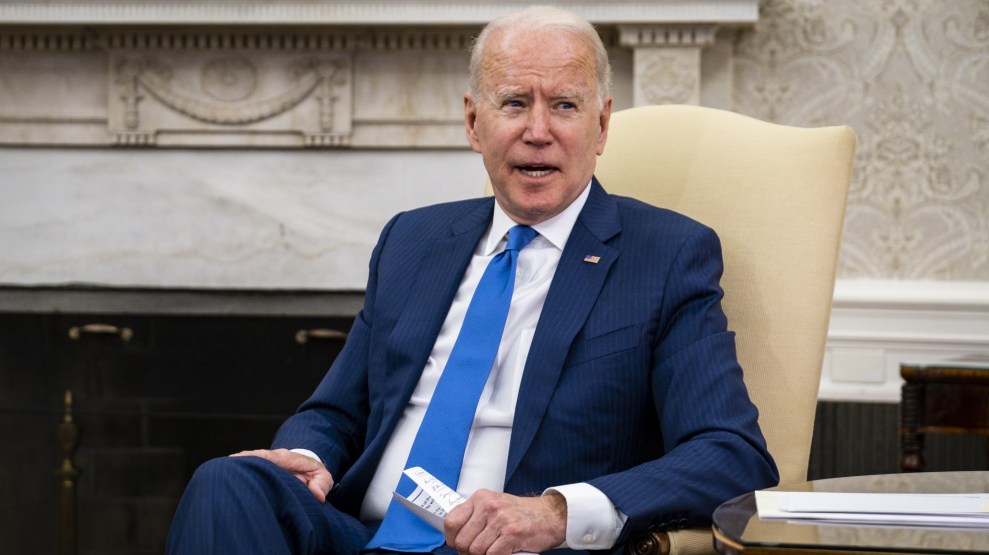
Sarah Silbiger/Bloomberg via Getty Images
The Afghanistan government’s collapse on Sunday brought an unceremonious end to the longest war in American history. It also, with shocking speed and clarity, signaled the return of the Taliban to power after two decades of guerrilla warfare against the United States and its allies. An Afghanistan newly under Taliban control poses an enormous threat to Afghan women, human rights activists, and the legions of Afghans who supported the US military effort such as translators, cooks, and cleaners.
Few Americans understand the plight of America’s Afghan allies as acutely as the attorneys who are working to evacuate them. Julie Kornfeld, a senior staff attorney at the International Refugee Assistance Project, told me her organization is representing more than 150 Afghan nationals as they look to leave the country. Many of them have applied for entry to the United States through the Special Immigrant Visa program, which has been wracked with delays and other bureaucratic problems since its creation.
The program’s issues, which Kornfeld attributes to a lack of staffing, proper training, and funding, have had a catastrophic impact on Afghans now under threat of retaliation from the Taliban. “There’s no organization, there’s no clarity,” she said. “It seems like no one really knows what’s going on.”
Her clients, which include men and women ranging in age from their mid-twenties to mid-seventies, include Afghan support staff in addition to people who did not work for the US military, but believe in its mission and support a democratic Afghanistan. These support staff that played a central role in assisting the US military presence in Afghanistan, but now are struggling to receive sanctuary in the United States. “With their employment or with their actions, they already risked their lives by supporting the US mission and the democracy of Afghanistan,” she said. “But now with the Taliban taking control, those that were in support of democracy are at risk.”
I spoke to Kornfeld about her clients, the visa approval process, and the rippling effects of the Biden administration’s haphazard withdrawal from Afghanistan.
The Special Immigrant Visa program for Afghan nationals has come under substantial criticism in the past year. Who would you blame most for the problems plaguing the program?
It’s an issue of slowness and inefficiency. While Congress, in 2009, did create the Special Immigrant Visa Program, and by law, established that the application should take nine months, I have yet to see one of my clients’ applications take nine months. In fact, I’ve had clients that have been waiting a decade.
This is an issue of the government not prioritizing resources to efficiently adjudicate these petitions. It comes from a lack of staffing. It comes from a lack of money. And it comes from a lack of training.
It seems like the Biden administration was slow to not only process these visas, but also address concerns about the process as the withdrawal was underway.
When Biden made the announcement that he was going to affirm the previous administration’s commitment to withdraw our troops, one of my clients was watching with bated breath, waiting for Biden to mention Afghan allies and what he was going to do to prioritize their safety. In that speech, he failed to mention Afghan SIVs. And so again, that’s an example of how this government and previous administrations have not prioritized this process. But since that announcement, because of advocacy and because of the humanitarian crisis that has been unfolding, there has been more attention. With that, there has been increased staffing. There has been new legislation that has expanded the eligibility requirements for Special Immigrant Visas, as well as opened up additional pathways.
While there are more individuals, these individuals are not well trained, nor are they able to keep up with the changes in the law. For instance, as an attorney I’ll receive responses from the National Visa Center that are either not responsive to the actual query or give me outdated information. The SIV eligibility law changed two weeks ago, and I have seen the NVC respond to an inquiry telling me that a client requires two years of service when now they only require 12 months.
Once the Taliban began advancing through Afghanistan, eventually making it to Kabul, how has your organization’s work been affected?
It’s important to back up and recognize that the Taliban has been making and actualizing on their threats for years. For example, in early or mid January, one of my clients who I’ve been representing since 2017 but who was in the SIV process since 2010 was murdered by the Taliban. What we’re seeing in the last 48 hours is just [an] increased Taliban presence and control over a country. Where I go with that is thinking that my client who was murdered in January is not going to be the only one of the clients that I have represented that has been murdered. I fear for all my clients’ safety now and I worry that their fate will succumb to the Taliban as opposed to the US government.
The Biden administration’s withdrawal process has come under substantial criticism recently. How would you characterize the way the administration has handled this withdrawal—which appears from afar to be extremely chaotic?
I think the word that you just used is exactly right: “chaotic.” One of the reasons why it’s chaotic is because they haven’t prioritized this program or the support that they would give to the Afghan people. They’ve also made delayed decisions on who to protect and now everyone is flying by the seat of their pants. There’s no organization, there’s no clarity. It seems like no one really knows what’s going on.
That is extremely hard as a legal advocate, but not only for me. My clients are hearing things in the media, they’re hearing things that government officials are saying about different pathways. It exhausts my clients’ attention and resources and gives them false hope. The government needs to not just make blanket statements, they need to actually provide details and policies and procedures for how people can actualize on the promises that the government is making. For instance, a refugee program was created to complement the SIV program two weeks ago. But we’re still waiting for clear guidance on how people can apply for that program or be admitted into the program. It seems to be a an employer has to refer you into the program. But there have been, as far as I’m aware, no referrals made, as of now.
What people need to understand is that in a humanitarian crisis, in situations of terror, individuals look for any potential light at the end of the tunnel. That’s what keeps them going. And when we provide little snippets of hope, little snippets of information, but [don’t] illustrate the details, that leaves room for misinformation. That leaves room for potential kinds of people taking advantage of others and it creates an even more desperate situation than the one that we’re already living in.
This interview has been edited for length and clarity.












